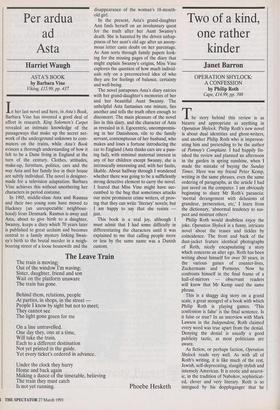Per ardua ad Asta
Harriet Waugh
ASTA'S BOOK by Barbara Vine Viking, £1 5.99, pp. 437 In her last novel and here, in Asta's Book, Barbara Vine has invested a good deal of effort in research. King Solomon's Caipet revealed an intimate knowledge of the passageways that make up the secret net- work of the underground unknown to com- muters on the trains, while Asta's Book evinces a thorough understanding of how it felt to be a Dane living in England at the turn of the century. Clothes, attitudes, make-up, furniture, politics, cars and the way Asta and her family live in their house are subtly individual. The novel is designer- made for a television adaptation. Barbara Vine achieves this without smothering her characters in period costume.
In 1905, middle-class Asta and Rasmus and their two young sons have moved to Hackney (an unrespectable neighbour- hood) from Denmark. Rasmus is away and Asta, about to give birth to a daughter, Swanny, keeps a diary which 70 years later is published to great acclaim and becomes central to a family mystery linking Swan- ny's birth to the brutal murder in a neigh- bouring street of a loose housewife and the disappearance of the woman's 18-month- old girl.
In the present, Asta's grand-daughter Ann finds herself on an involuntary quest for the truth after her Aunt Swanny's death. She is haunted by the driven unhap- piness of her aunt's old age after an anony- mous letter casts doubt on her parentage. As Ann sorts through family papers look- ing for the missing pages of the diary that might explain Swanny's origins, Miss Vine explores the question of how much individ- uals rely on a preconceived idea of who they are for feelings of balance, certainty and well-being.
The novel juxtaposes Asta's diary entries with her grand-daughter's memories of her and her beautiful Aunt Swanny. The unhelpful Asta fantasises one minute, lies another and tells the truth often enough to disconcert. The main pleasure of the novel lies in this diary, and the character of Asta as revealed in it. Egocentric, uncompromis- ing in her Danishness, vile to the family servant, contemptuous of her husband, who makes and loses a fortune introducing the car to England (Asta thinks cars are a pass- ing fad), with minimal maternal interest in any of her children except Swanny, she is intrinsically interesting and, with her faults, likable. About halfway through I wondered whether there was going to be a sufficiently strong detective element to carry the novel. I feared that Miss Vine might have suc- cumbed to the bug that sometimes attacks our most prominent crime writers, of prov- ing that they can write 'literary' novels; but I am happy to say that she resists — just.
This book is a real joy, although I must admit that I had some difficulty in differentiating the characters until it was explained to me that calling people more or less by the same name was a Danish custom.


























































 Previous page
Previous page